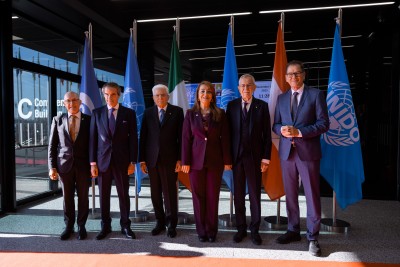Austria and Italy Together With UNODC Urge Global Alliance Against Organized Crime
The threats posed by transnational organized crime are more complex, interconnected, and dangerous than ever before. In light of these developments, Austrian President Alexander Van der Bellen and Italian President Sergio Mattarella, together with Ghada Waly, Executive Director of the United Nations Office on Drugs and Crime (UNODC), have called for renewed global solidarity.
 On the occasion of the 25th anniversary of the Palermo Convention, President Van der Bellen and Italian President Sergio Mattarella attended the ceremony at the UNO City in Vienna. Rob Floyd, Rafael Grossi, Ghada Waly, and Gerd Müller were also present. / Picture: © Österreichische Präsidentschaftskanzlei/Peter Lechner/HBF
On the occasion of the 25th anniversary of the Palermo Convention, President Van der Bellen and Italian President Sergio Mattarella attended the ceremony at the UNO City in Vienna. Rob Floyd, Rafael Grossi, Ghada Waly, and Gerd Müller were also present. / Picture: © Österreichische Präsidentschaftskanzlei/Peter Lechner/HBF
The occasion was a high-level commemorative event at the UNO City in Vienna, marking both the International Day Against Transnational Organized Crime and the 25th anniversary of the UN Convention Against Transnational Organized Crime (UNTOC), known as the Palermo Convention.
An “indispensable tool” in the fight against global threats
President Van der Bellen emphasised that organised crime—from drug cartels to human trafficking, cybercrime, and money laundering—poses a “treacherous and constant threat” to all societies. This crime flourishes with the advances of globalization and technology and infiltrates economies and institutions worldwide.
“Global challenges like these require global responses,” said Van der Bellen. The Palermo Convention is an “indispensable tool” for this, he said, having helped over the past 25 years to adapt legal frameworks, strengthen law enforcement, and intensify international cooperation.
President Mattarella emphasised the importance of international cooperation in investigations as essential to combating organised crime. He described the joint effort as a “shared moral responsibility.”
UNODC Executive Director Ghada Waly called for “breathing new life” into the convention in order to respond to new threats, from darknet drug markets to environmental crime. She said the convention was the greatest strength in creating a level playing field for justice, where criminals and their profits could hide nowhere.
Austria's commitment and the legacy of Falcone and Borsellino
Austria, which signed the convention back in 2000, is no “island of bliss” in the face of this threat. Federal President Van der Bellen referred to Austria's measures to trace illegal assets, combat money laundering, and set up specialised cybercrime units.
Italian President Mattarella also paid tribute to the legacy of the famous anti-Mafia judges Giovanni Falcone and Paolo Borsellino during a visit to the photo exhibition “The Legacy of Falcone and Borsellino,” which took place on the sidelines of the event in Vienna. Italy is considered the “midwife” and traditional supporter of the convention.
Background: The Palermo Convention (UNTOC)
The UN General Assembly adopted the convention on November 15, 2000, in Palermo. It entered into force in September 2003 and has been ratified by 190 states.
The UNTOC is the first comprehensive and legally binding framework for promoting international cooperation and strengthening national capacities in the fight against transnational organized crime.
It is supplemented by three additional protocols: 1. Protocol to Prevent, Suppress and Punish Trafficking in Persons, Especially Women and Children. 2. Protocol against the Smuggling of Migrants by Land, Sea and Air. 3. Protocol against the Illicit Manufacturing of and Trafficking in Firearms.
In March 2024, the United Nations officially declared November 15 the International Day for the Prevention and Combating of All Forms of Transnational Organized Crime with Resolution A/RES/78/267 in order to raise global awareness and promote the full implementation of the Convention.



